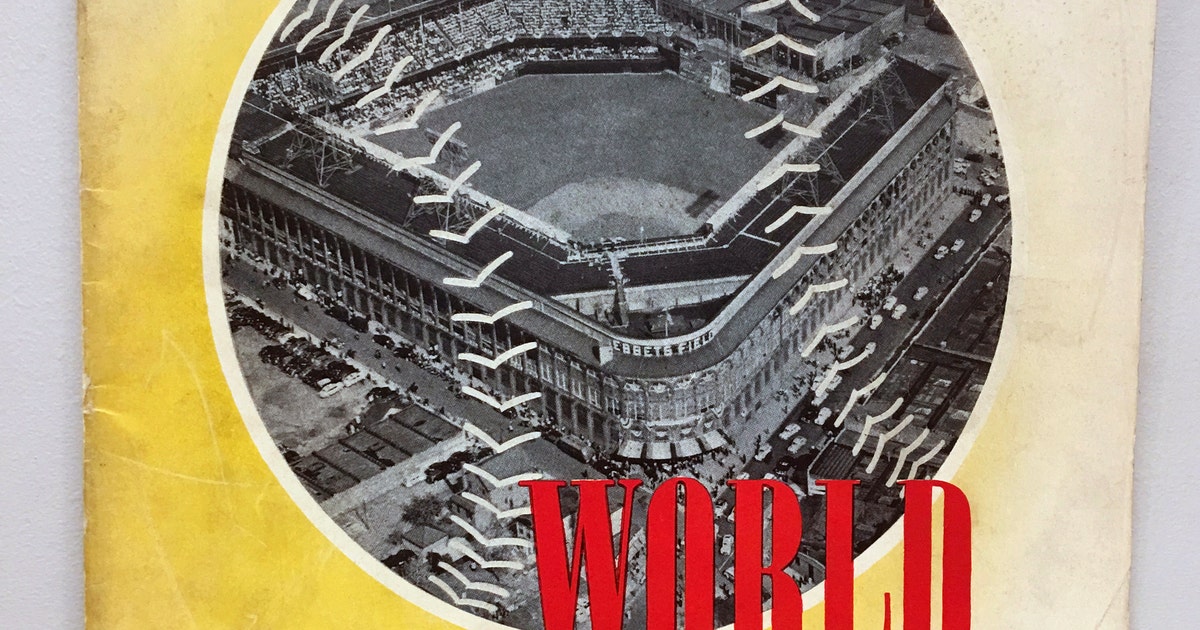
BOSTON (AP) — It took more than a century for these clubs to finally meet again in the Fall Classic.
They had plenty of stars, especially during baseball’s Golden Era — Ted Williams, Jackie Robinson and The Duke of Flatbush, among them.
But a World Series between the Red Sox and Dodgers just wasn’t part of the program.
Or was it?
Because a lucky few still have a souvenir of their greatest near-miss: a copy of the “official program” for the 1946 World Series between the Brooklyn Dodgers and the Boston Red Sox.
Of course, they didn’t play that year, it was a phantom series. The St. Louis Cardinals swept Brooklyn in a best-of-three playoff for the NL pennant, and went on to beat Boston in Game 7 for the championship.
“We never met the Red Sox,” longtime Brooklyn pitcher Carl Erskine, now 91, reminisced this week. “I pitched in the World Series five different years, always against the Yankees. I never got to pitch at Fenway Park.”
Even so, the Harry M. Stevens company was prepared. That was the concessionaire for the Dodgers, Yankees and Giants, and it needed to be ready in case the Dodgers advanced.
So it printed up the program for games in Brooklyn, just in case. Featuring a neat, overhead photo of Ebbets Field on the cover, the 40-page booklet was priced at 25 cents.
Inside, the expected lineups and batting orders were listed. Duke Snider, Pee Wee Reese and Carl Furillo would be starting for the Dodgers, and Williams, Johnny Pesky, Dom DiMaggio for the Red Sox.
Brief bios were done on the players. The write-up on Williams noted, “he’s the only .400 hitter in the past decade.”
A fast recap of the season mentioned Branch Rickey, saying, “the 1946 pennant of the Dodgers marks his first triumph as president and part owner of the Brooklyn club.”
There were plenty of ads, including this one signed by the president of the Brooklyn Trust Company: “Congratulations! We join with the millions of other baseball fans in offering congratulations to the Brooklyn Dodgers upon their winning the National League pennant.”
What happened to most of those programs, no telling. But some show up for sale on the internet for several hundred dollars.
Years later, the clubs came close a couple times.
The Red Sox next went to the World Series in 1967, a season after the Los Angeles Dodgers made it. Boston was back in ’75, a year after the Dodgers.
Not until Tuesday night at Fenway will they square off for real in October, for the first time since Babe Ruth and the Red Sox beat Brooklyn in 1916.
Erskine said he’d be watching this week from his home in Anderson, Indiana, cheering for his old club.
He signed with the Dodgers in 1946 at age 19 and played that season in the Class B Three-I League, which had teams in Illinois, Indiana and Iowa.
Erskine recalled rooting for Brooklyn in the NL pennant playoff — the Dodgers lost 4-2 at Sportsman’s Park in St. Louis, then fell 8-4 at home. The World Series began three days later at the Cardinals’ field.
The next year, big league baseball changed forever when Jackie Robinson joined the Dodgers and broke the color barrier. He played that fall when Brooklyn took on the Yankees.
“I remember listening to that World Series on the radio. We didn’t have television back home,” Erskine said. “I couldn’t have imagined I’d be playing with Jackie in the majors the next year.”
Erskine indeed made his debut in 1948. In 1953, he set a World Series record with 14 strikeouts in a game, fanning Mickey Mantle all four times he came to the plate in a 3-2 win at Ebbets Field.
Erskine saw a lot of the Yankees over the next several years. But he never ran across the Red Sox in a game that counted.
“They had good clubs in those days, but the Yankees were dominant,” Erskine said.
“It’s funny, the Red Sox had wanted to sign me,” he said, laughing. “Who knows, if I had signed with them, maybe there would have been a Red Sox-Dodgers World Series.”
Be the first to comment